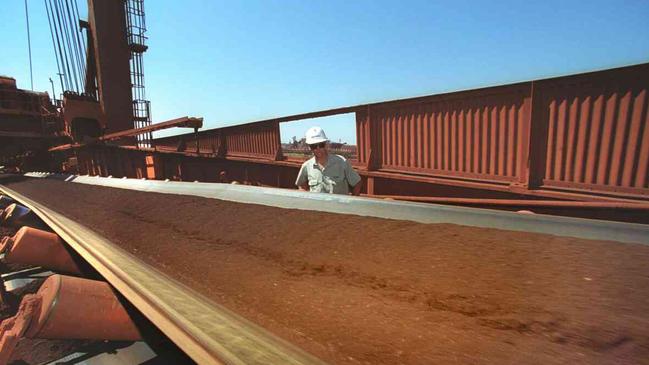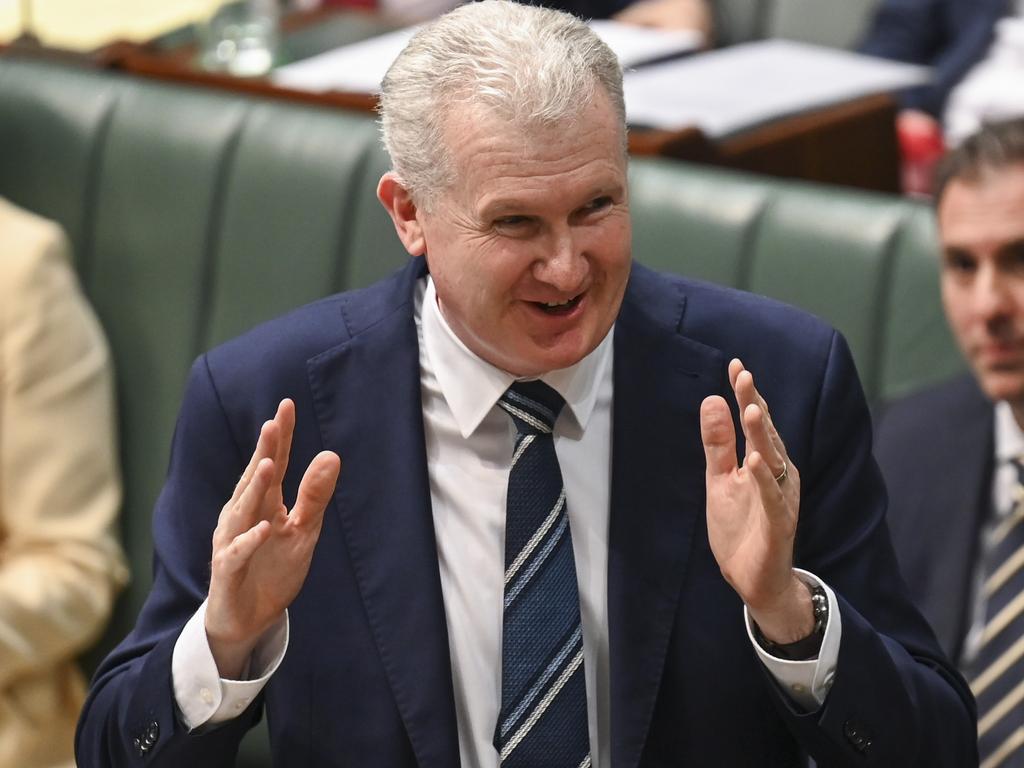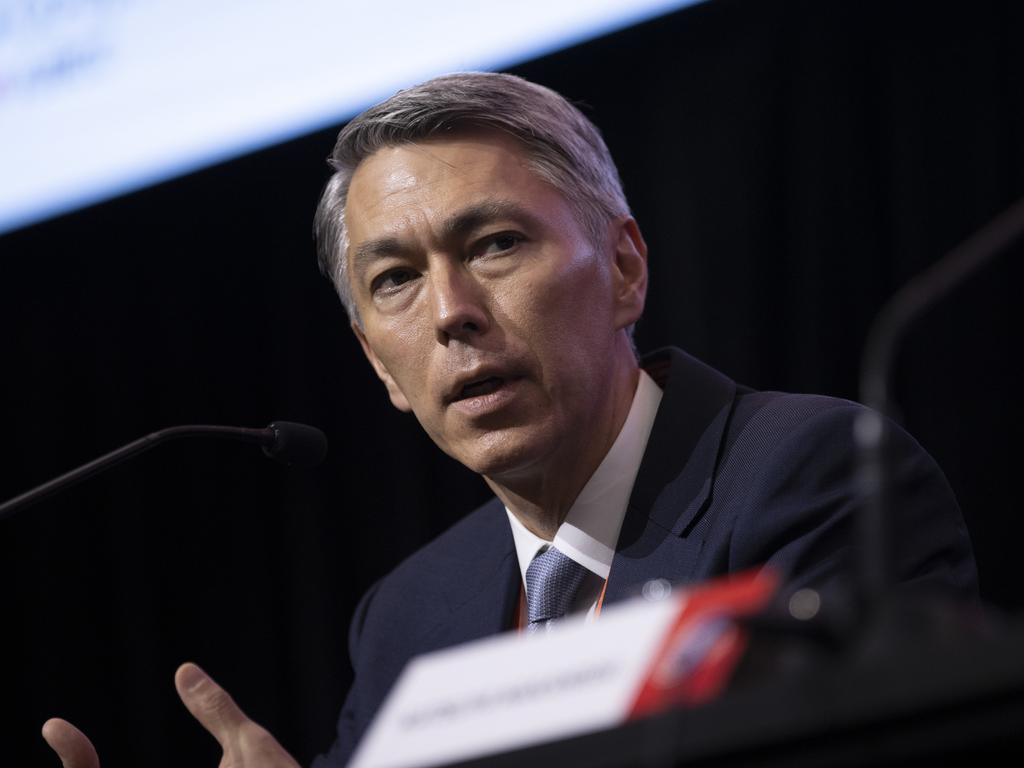Pilbara ‘power grab’: Bosses accuse unions of exploiting ‘deliberate loophole’ in Labor’s IR laws
Employers have accused unions of a power grab after they capitalised on Labor’s workplace laws to force BHP to start negotiating the first union collective agreement in the Pilbara for almost a decade.

Employers have accused unions of a productivity-sapping power grab after they capitalised on federal Labor’s workplace laws to force BHP to start negotiating the first union collective agreement in the Pilbara for almost a decade.
Unions will push for hundreds of workers at BHP’s large Area C and South Flank iron ore mines in the Pilbara to get guaranteed annual 5 per cent wage rises, higher wages for long-serving tradesmen and improved rosters.
Minerals Councils of Australia chief executive Tania Constable slammed the push, accusing unions of exploiting a “deliberate loophole” in Labor’s laws where unions no longer have to demonstrate majority support of workers to force bargaining but can do it within five years of an agreement expiring. The last collective agreement expired in August 2019.
Putting further pressure on BHP to strike a collective agreement, the new laws mean unions can seek an intractable bargaining declaration from the Fair Work Commission if there is no deal after nine months of bargaining.
Ms Constable said the power grab by unions wanting to re-unionise the Pilbara would deliberately force lower productivity on Australia’s most important industry. “The mining sector has repeatedly warned the Albanese government of the economic dangers posed by its reckless overhaul of industrial relations laws. We are now beginning to see the consequences,” she said.
“This move is of grave concern to the economy of Western Australia, which is already beginning to feel the headwinds of falling commodity prices and increasing competition in critical minerals, which have forced multiple shutdowns and job losses across the state. This push by unions to use Labor’s laws to increase their control at the same time as reducing productivity will have long-lasting economic repercussions, not just for the Pilbara but for the entire nation.”
Workplace Relations Minister Murray Watt said “unlike the MCA, I won’t talk down the WA mining industry and I won’t criticise employers and unions who seek to reach a workplace agreement – a better deal for WA mine workers is a better deal for the WA economy”.
Opposition employment spokeswoman Michaelia Cash said the successful use of the laws by unions against BHP was “proof the Albanese government’s industrial relations laws are a direct attack on WA and our mining industry – Mr Albanese keeps saying he gets WA but this couldn’t be further from the truth.”
“His government has enacted legislation that directly affects the wellbeing of our state and the industry that is the engine room of the nation’s economy,” she said.
“Mr Albanese has duped the voters of WA.”
BHP intends to bargain with the Australian Workers Union, the Electrical Trades Union and the Australian Manufacturing Workers Union rather than the Western Mine Workers Alliance, made up of the AWU and the Mining and Energy Union.
“The AWU, ETU and AMWU have initiated bargaining unilaterally under the new legislation, which does not require the unions to establish that the workforce is in favour of bargaining,” a BHP spokesperson said.
“BHP will comply with our obligations under the new section of the Fair Work Act and bargain with the AWU, ETU and AMWU.”
National leaders of the Western Mine Workers Alliance will visit the Pilbara this week to engage with hundreds of mine workers about the union’s strategy to undertake site-based collective bargaining.
“Iron ore miners at BHP should feel very proud of this breakthrough,” WMWA spokesperson and MEU WA secretary Greg Busson said.
“They have stood strong together and demonstrated to the company they are determined to negotiate collectively on a new and improved agreement. To BHP management’s credit, they have agreed to come to the table and negotiate in good faith.”
Unions intend to pursue across-the-board annual pay rises rather than tying increases to performance, more worker-friendly rosters and pay increases for more experienced employees who have seen new employees hired on higher base salaries due to labour shortages.
Unions also want to negotiate with Rio Tinto but are unable to use the five-year trigger as there has not been a collective agreement covering their Pilbara mine workers for decades.
AWU WA secretary Brad Gandy said Rio Tinto “needed to start listening to its employees”.
“BHP’s approach contrasts sharply with Rio Tinto, which is still digging in and refusing to negotiate collectively with its Pilbara-based mineworkers … small wonder Rio has the highest employee turnover of all the big miners,” he said.
“Iron ore miners at Rio Tinto tell me they simply wish to discuss their pay, conditions and rosters but Rio seems determined to continue ignoring them.
“Rio Tinto needs to understand the industrial relations system has changed, and we now have a government that wants to see workers acknowledged and not ignored. Rio needs to follow BHP and bargain collectively with workers and their representatives.”
Rio Tinto declined to comment on Sunday but in February chief executive Jakob Stausholm said the workplace changes risked a return to the environment of the 1980s when the company endured 100 strikes a year.








To join the conversation, please log in. Don't have an account? Register
Join the conversation, you are commenting as Logout